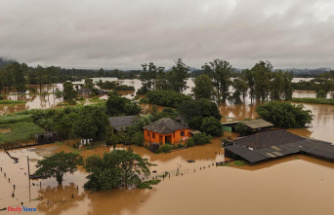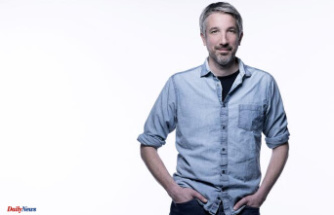No less than eight African ministers in charge of digital and nearly 700 people traveled from Antananarivo to attend the 12th Conference on Digital Transformation in Africa (ATDA), for which Madagascar literally rolled out the red carpet. And it was the Madagascan President Andry Rajoelina himself who came to open the debates before taking the time to visit the digital village. It must be said that with the presidential election looming next November, even if he has not yet announced his candidacy, he has every interest in highlighting one of the sectors where the country has made notable progress. , particularly in terms of connectivity and the development of services.
This is the first time that the ATDAs have been done in sub-Saharan Africa, after being hosted in Morocco in 2021 at the Mohammed-VI-Polytechnic University, where the alternation between Europe and Africa had been decided. Each year, these meetings organized by Mohamadou Diallo, president of CIO Mag and founder of ATDA, bring together the actors of digital transformation from the public and private sectors, civil society and donors around issues related to the challenges of transformation digital on the continent.
"We are here to share our experiences, best practices and strategies in digital transformation... with the main theme of human capital as a catalyst for a successful African digital system," said Tahina Michel Razafindramalo, Minister of Digital Development, Digital Transformation, Posts and Telecommunications of Madagascar whose ministry was heavily involved in the organization of these two days of conferences. “The digital skills needs in Africa will amount to 230 million people by 2030. We barely cover 5 to 10% of these needs depending on the country. I let you imagine the magnitude of these challenges that await us, ”launched Mohamadou Diallo by opening this Assizes. “Faced with this threat linked to the demographic dividend, this young population remains a tremendous opportunity for our countries. On the other hand, if we miss this turn, it will turn into a bomb whose explosion will have devastating effects for the whole planet”, he continues.
To get to the heart of the matter, eight ministers responsible for digital – Burundi, Comoros, Ghana, Madagascar, Mauritius, Mauritania, Republic of Congo and Zambia – presented the strategies deployed to meet the digital challenges of their respective countries. Access for all remains a concern, especially in rural areas. They discussed the beneficial effects of digital transformation on the public sector through governance, transparency and the fight against corruption and consider that digital transformation remains one of the main levers of economic development. They also discussed the importance of cybersecurity, cooperation between countries for the implementation of roaming and the creation of a digital identity for all. The ministers emphasized the education and training of young people in the digital field and the importance of mastering computer tools.
Training programs have been launched to equip young people with digital skills and encourage the participation of women. “African youth are key to our success. We need to ensure that these youth are equipped with the necessary skills to navigate this digital environment. It is imperative to invest in education,” argued Deepak Balgobin, Mauritius Minister of Technology, Information, Communication and Innovation. For her part, Ursula Owusu-Ekuful, Minister of Ghana, insisted on the place that should be reserved for women. An annual program makes it possible to train, from region to region, 1,000 girls, 100 teachers per year in the field of ICT, with schools equipped with computer equipment. In Côte d'Ivoire, 01 Talent is setting up a campus dedicated to women.
While initiatives and training are on the rise, the digital skills gap remains. "Today, we have around 700 engineers trained per year in Madagascar, which is insufficient to meet local demand," notes Tahina Michel Razafindramalo. The African continent has only 750,000 developers, according to a Google study, recalls, by videoconference, Karim Sy, founder of Jokkolabs and partner of 01 Talent Africa. As a result, large companies on the continent are setting up training to meet their own needs and train their employees.
“At Axian, we have been working on training for about ten years. We started with an Energy Academy, then we launched a Sale Academy and a Finance Academy,” says Hassanein Hiridjee, CEO of Axian. The group, a Malagasy giant, is deployed through many activities in Madagascar, from telecoms to energy, including real estate and innovation, but also in a dozen countries on the continent. "Faced with this exponential need for training, we launched Axian University, 6 years ago, a much more ambitious project which brings together training from all sectors but also soft skills in order to meet the needs of our employees, the base to top management. Axian University provided 70,000 hours of training for the group last year,” he explains. With a turnover of 1.9 billion dollars and 6,500 employees, a number that has doubled since 2019, we understand that training is a priority.
It must be said that university systems are struggling to keep up with this digital revolution. “With technologies advancing very quickly, we need to rethink the approach to training. […] If we are not careful, at the end of the training, it is already outdated. The interest is then to move towards peer-to-peer approaches (peer learning) developed by Xavier Niel's School 42, then at 01 Talent but also at the Web Academy (Epitech)", explains Karim Sy. Learning takes place without teachers or didactic courses but through projects and in teams, close to working conditions. For its part, 01 Talent even offers employment, from the start of the training, with partners such as Atos in Dakar. The selection is severe: in Senegal, out of 9,500 applications, 100 were accepted.
For her part, Carole Rakotondrainibe, who heads the Nexta platform, a start-up incubator of the Axian group, explains that supporting entrepreneurs also involves training: “We have just over 200 training modules. In 2022 alone, we trained more than 2,000 people in digital careers. »
At the continental level, the Smart Africa Alliance, a pan-African initiative to foster digital development in Africa, has launched a program, Smart Africa Digital Academy (SADA), to strengthen the digital skills of decision-makers and governments in interested countries. Six countries have already committed to this program, which offers advanced training in ICT, artificial intelligence and cybersecurity. Sierra Leone thus joins Rwanda, Ghana and the Republic of Congo, Benin and Côte d'Ivoire. Others should follow, such as Burkina Faso, Tunisia, Kenya and Djibouti. Large companies, SMEs, start-ups but also public sectors, all sections of society need digital skills to develop. Initiatives are multiplying on the continent, both for initial training and continuing education, which is good because the needs are immense.
Once educated and trained, African countries face brain drain. "How do you retain skills? asks Kamalidini Souef, the Minister of Posts, Telecommunications and the Digital Economy of the Comoros, who says that of the 25 young people trained in master 2 in the digital field, 6 months later, 24 went to foreign. The only one who remained made this choice to stay with her sick mother. According to him, we must think about international standards to retain talent.
For her part, Tahina Michel Razafindramalo observes that this phenomenon of brain drain does not just happen when you leave school, but after three to five years of experience in business or administration. “There were not many departures in 2020 and 2021 with the Covid, but, from memory, in 2022, almost 300 people went abroad with the “talent visas”. It's a long fight, a political fight, because the embassy in France does not release the figures for talent visas, versus tourist visas and business visas. A lot of tourist visas are refused, but I don't know of any talent visas that have been refused,” he points out.
Globally, there is a shortage of trained talent, such as in France, Canada and the United States. Competition is in full force and everyone is trying to attract the right profiles. A phenomenon that Karim Sy describes as a talent war. It's up to everyone to find their recipes to keep their talents, to make them grow. "A successful company, the quality of life at work, the challenge but also facilitated mobility between Madagascar and the continent and vice versa", proposes Hassanein Hiridjee.
As we can see, digital transformation in Africa requires significant investments in human capital, particularly in terms of training, education, entrepreneurship, awareness, infrastructure and digital inclusion. Issues that involve everyone: governments, businesses, educational institutions and civil society.












